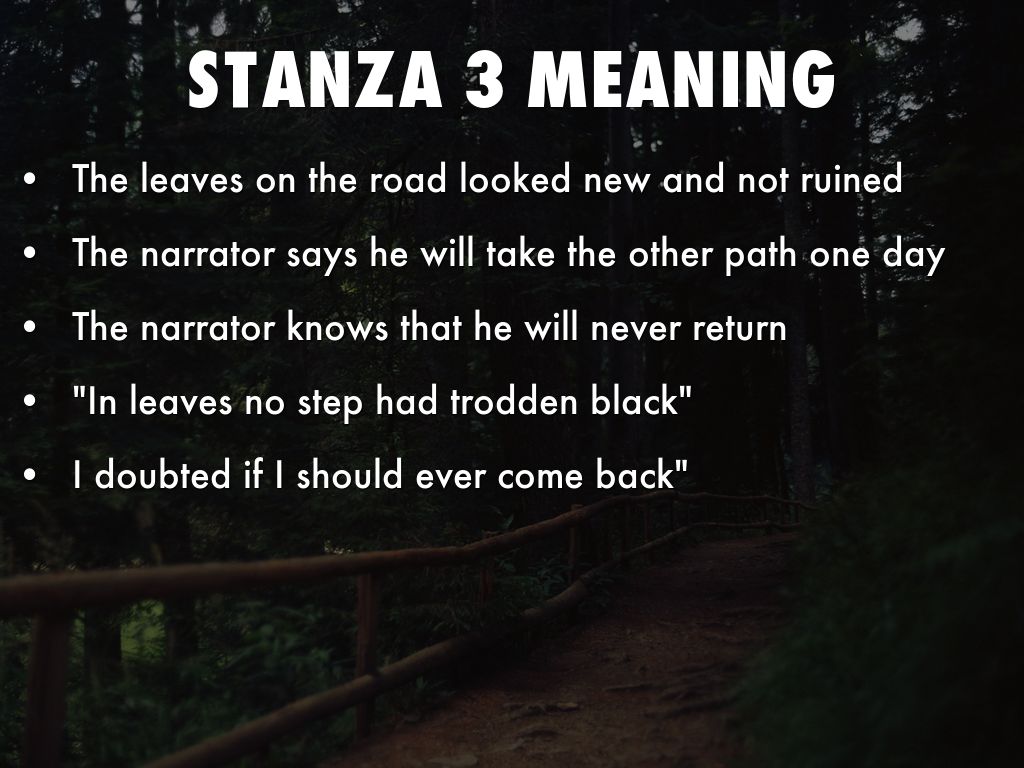
He postponed his plan to take the first route and chose the second. That morning the road on which no step had trodden lay there welcoming him. In the third stanza, the author explains both his fear and his determination to travel on a new route. This road lay there as if waiting for the special traveler who had the guts to step down on it and be taken to his destination. Then rather than choosing the first one, he turned towards the second, the one which less feet had traveled and where the grass was still green waiting to be stepped upon. One day he was standing in a wood where two roads lay before him and he looked down one till it finally bent and disappeared behind trees and bushes. The poet takes us closer to the nature and its beauty to acquaint us with his point.


A lone traveler standing in yellow woods trying to decide between two routes – one he is familiar with and the other that is not taken. Most of the appear in the poem is due to the plentiful use of imagery. However, there is no bigger accident than having lost your urge to explore new things. So, they choose to travel the more traveled routes where there are less chances of accidents. In the modern age especially, people do not love the toil but only want results. If we do otherwise and dare to take difficult roads, we would be taken to prettier destinations. Through the example of two roads in the woods, the poet explains how we are used to making easy choices in life. If you are looking for things of value you will have to dig deeper and explore the unexplored. However, the problem is that convenient routes lead to convenient destinations. What happens in general life is that every person keeps looking for convenient routes to success. It inspires to do things that few people dare to do. The Road not Taken is an inspirational poem by Robert Frost that tries to inspire us to rise above the petty and do things extraordinary. Similarly, in our lives, we are afraid of the things that appear to be difficult.The Road not Taken by Robert Frost: Summary and Analysis The right thing in the poem is the path which appears to be untouched, with leaves that look fresh with no clear destination. Similar to which in our lives they represent the easy choices. The easy thing here in the poem is the road with the “trampled” black leaves. This poem is about choices of our lives, and we must remember that the easy thing and the right thing are never the same things. For once we choose a path, we’ll never be able to come back. But then again, if we decide to choose a path that others don’t and walk unafraid, surely we’ll be happy with our choice. Often we choose what we see others doing or choose the same direction as others.

So, just as the author, we are challenged with many choices and opinions about many matters in our lives. All in all, this poem is about the choice the speaker has made. And in the end, years later, he would say that in the woods he came across two roads, and he took the one that was less traveled. Furthermore, the poet says that he does not know where the paths lead. Whereas, the leaves on the other path appear to be trampled upon, suggesting many have not walked that path. Also, he goes on and symbolizes the easy “ choices” with trampled leaves on of the paths. The author means, that he regrets that he’d have to choose one of the paths. Here in the poem, the speaker says, “Two roads diverged in the yellow wood, and sorry I could not travel both”. About plunging yourself in the great unknown, doing things that scare us. This poem gives a strong message about choice. I shall be telling this with a sigh Somewhere ages and ages hence: Two roads diverged in a wood, and I- I took the one less traveled by, And that has made all the difference. Oh, I kept the first for another day! Yet knowing how way leads on to way, I doubted if I should ever come back. Two roads diverged in a yellow wood, And sorry I could not travel both, Be one traveler, long I stood, And looked down one as far as I could To where it bent in the undergrowth Then took the other, as just as fair, And having perhaps the better claim, Because it was grassy and wanted wear Though as for that the passing there Had worn them really about the same, And both that morning equally lay In leaves, no step had trodden black.


 0 kommentar(er)
0 kommentar(er)
